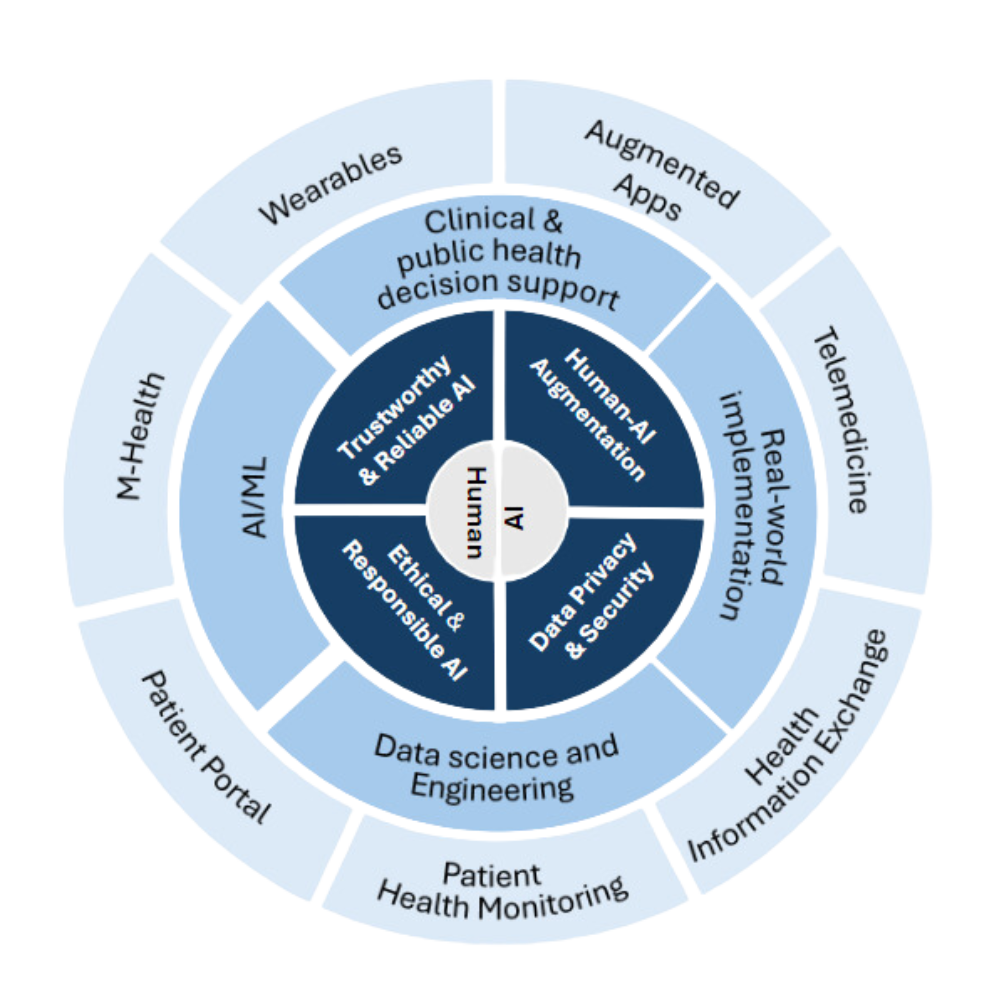Research Focus
AHeAD will conduct pre-competitive research focused on developing usable and trustworthy AI-powered solutions for early disease detection, proactive health management, personalized monitoring of health and well-being facilitated by emerging technology that enable health access such as wearables, mhealth technologies, EHRs, and Telemedicine.

Trustworthy & Reliable AI: Imagine using AI to help doctors diagnose individual patients while simultaneously tracking disease patterns across entire populations - that's already becoming our reality. But with this dual power comes a crucial challenge: how do we ensure these AI systems make reliable decisions from the examination room to the policy level? A trustworthy healthcare AI isn't just accurate - it's transparent about its recommendations, fair to all patients and communities, and carefully balances individual care with population health needs. Building such systems requires rigorous testing at both clinical and population levels, clear ethical guidelines that bridge personal and public health, and meaningful oversight by healthcare professionals and public health experts. When we get this right, the benefits are transformative: doctors can make better diagnoses while health officials can simultaneously spot disease outbreaks and allocate resources more effectively, creating a healthcare system that works better for everyone, from individual patients to entire communities.
Human-AI interaction and Augmentation: Think of AI not as a replacement for human care and expertise, but as a supportive partner for those who help others. Imagine a social worker who can quickly spot patterns in family support needs across their community, a public health analyst who can better predict where health services are most needed, or a nurse who can spend more time with patients because AI helps handle routine documentation. The challenge is creating AI systems that truly enhance these human-centered roles - understanding emotional cues, analyzing community trends, and supporting complex care decisions. When we get this right, it means social workers can identify at-risk families sooner, public health teams can distribute resources more effectively to underserved areas, and nurses can focus more on patient care rather than paperwork. It's about amplifying the human touch in these critical roles, making our healthcare and social services smarter and more responsive to community needs, while keeping human compassion and professional judgment at the center of every decision.
Ethical and responsible AI: As AI increasingly shapes decisions that affect our lives - from healthcare access to social services - we face a crucial question: how do we ensure these powerful tools work fairly for everyone? Ethical and responsible AI isn't just about making systems that perform well; it's about creating technology that respects human dignity, promotes fairness, and benefits all communities. This means building AI that can explain its decisions, recognize and address biases, and protect privacy while still getting the job done. When we get this right, something remarkable happens: communities that were historically overlooked get better services, organizations can innovate with confidence, and technology advances in a way that truly serves everyone - not just a select few. It's about making sure AI's promise of a better future includes all of us.
Healthcare data privacy and security: Imagine having a medical breakthrough that could save lives - but it requires analyzing millions of patient records across hundreds of hospitals. Here's the challenge: how do we share this vital medical data while keeping everyone's personal health information private and secure? Enter innovative solutions like federated learning, which acts like a traveling researcher who learns from each hospital's data without ever taking the sensitive information home. It's like having the best of both worlds - doctors and researchers can spot life-saving patterns across huge datasets, while patients maintain control over their private health information. When we get this right, the possibilities are exciting: hospitals can work together to develop better treatments, AI can help detect diseases earlier, and your personal health data stays secure. It's about unlocking the power of shared medical knowledge while ensuring your privacy remains protected every step of the way.
The following are the research focus areas of the center-
- AI/ML: Federated Learning, Interpretability, Explainability, NLP, Physics-based Learning, Fairness, Multimodal learning, Knowledge-based representation, computer vision, NLP
- Data Science and AI Engineering: Data Security, Edge and Embedded AI, ML Engineering, Data Engineering, Data Collection, Personalization, edge AI
- Clinical and public health decision support: Stakeholder analysis, user behavior (patients, nurses, doctors), decision augmentation, evaluation of health outcomes
- Implementation science: stakeholder analysis (focus groups, interviews, surveys), HCI studies, usability studies
